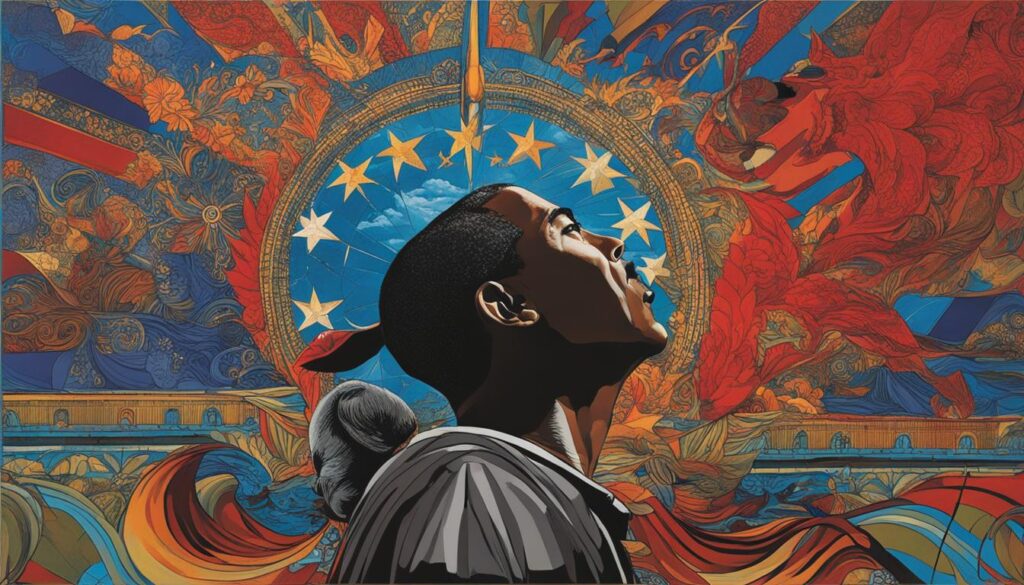Get ready to embark on a journey of self-discovery, thoughtful contemplation, and profound insights. In this audiobook review, we explore “The Audacity of Hope” by Barack Obama, a powerful and insightful narrative that sheds light on the former President’s visionary leadership, values, and philosophies.
Through this audiobook, you will gain valuable insights into Obama’s perspectives on race, democracy, faith, and more, presented in an engaging and persuasive storytelling style. As we progress through this review, you will discover the impact and significance of “The Audacity of Hope” in the current political and social scenario. So, sit back, relax, and join us on this illuminating journey.
About “The Audacity of Hope”
“The Audacity of Hope” is a political memoir written by Barack Obama, published in 2006 and considered one of the most informative and insightful books ever written by a U.S. politician. The book provides readers with a glimpse into Obama’s life, from his early days growing up in Hawaii and Indonesia to his professional career as a community organizer and U.S. Senator. It also delves into his vision for America and his perspectives on various social and political issues.
The book is structured into nine chapters, each focusing on a different theme, such as democracy, race, and faith, which are central to Obama’s vision for America. It is written in a conversational style, making it easy for readers to understand complex political issues.
The author’s intention behind writing “The Audacity of Hope” was to provide a glimpse into his personal and professional life and share his vision for America. Obama aimed to spark a dialogue around critical issues facing the nation. Through his writing, he sought to encourage readers to consider their own perspectives on these issues and engage in thoughtful debate.
Background of Barack Obama
Barack Obama, born in Honolulu, Hawaii in 1961, is an American politician, lawyer, and writer who served as the 44th President of the United States from 2009 to 2017. Obama is a graduate of Columbia University and Harvard Law School, where he distinguished himself as the first black president of the Harvard Law Review. He was elected to the Illinois State Senate in 1996, serving there until 2004, when he was elected as a United States Senator from Illinois, a position he held until 2008.
His experiences as a community organizer and his work as a civil rights lawyer and an Illinois state senator gave him a unique perspective on American politics, which he brought to the White House. Obama’s legacy as the first black President in U.S. history and a prominent leader in progressivism has cemented his place as an iconic figure in American history and society.
Obama’s background and perspectives inform the narratives presented in “The Audacity of Hope,” giving readers a glimpse into his vision for America and his ideas for moving the country forward.
Narration and Production
One of the key aspects of the audiobook version of “The Audacity of Hope” that must be examined is the narration and production quality. The narration is performed by former President Barack Obama himself, enhancing the value of his personal touch and voice in the story. His style of narration is engaging and well-paced, maintaining the listeners’ attention throughout.
Furthermore, the production quality of the audiobook is exceptional, providing high-quality sound and keeping the listener’s attention on Obama’s words. The sound quality is clear and consistent, without any distracting background noises. The dialogues, pause, tone, and pace are all coordinated effectively, creating a smooth and immersive listening experience.
In summary, the narration and production quality of “The Audacity of Hope” enhances the overall experience of listening to Barack Obama’s thoughts and insights. It creates a natural and engaging presentation of the ideas shared by the former President, allowing listeners to appreciate the book to its fullest extent.
Key Themes Explored
In “The Audacity of Hope,” Barack Obama explores various key themes relevant to American society. These themes include:
| Theme | Description |
|---|---|
| Race | Obama reflects upon his own experiences with race and discusses the ways in which America is affected by racial tensions. |
| Democracy | Obama emphasizes the importance of democracy as a cornerstone of American society and explores what it means to participate in a democratic society. |
| Faith | Throughout the book, Obama articulates the role of faith in his own life and in the lives of Americans in general. |
| Unity | Obama advocates for unity as an essential aspect of American society, discussing ways in which individuals and groups can work together, despite differences, to achieve common goals. |
Through thoughtful analysis and reflection, Obama provides compelling insights into each of these themes and their intersection in America.
Engaging Storytelling
The success of “The Audacity of Hope” largely rests on Barack Obama’s captivating storytelling abilities. Throughout the book, Obama masterfully employs various narrative elements to bring his ideas to life. By incorporating personal anecdotes, historical references, and persuasive arguments, Obama engages readers and gives a sense of intimacy to his message.
One striking example is when Obama recounts the story of his grandmother, who taught him about the “quiet dignity” of working hard and taking responsibility. This story serves as a powerful metaphor for his vision of America, where everyone has the opportunity to succeed with hard work and perseverance.
Another effective tool used in “The Audacity of Hope” is repetition. Obama repeats certain themes and ideas throughout the book, giving readers a sense of familiarity and reinforcing key messages. For instance, he frequently references the phrase “Yes we can,” which became a rallying cry for his 2008 presidential campaign. By repeating this phrase, Obama emphasizes the idea that change is possible and inspires readers to take action.
The use of storytelling and other narrative devices in “The Audacity of Hope” makes for a compelling and thought-provoking read. Obama’s ability to connect with his audience through compelling stories and relatable experiences is a testament to his skills as both a writer and a leader. By harnessing the power of narrative elements, Obama creates a powerful vision for America and inspires readers to imagine a better future.
Analysis of Key Chapters

As we delve deeper into “The Audacity of Hope” by Barack Obama, it’s important to examine some of the standout chapters that contribute to the overall impact of the book. These key chapters offer valuable insights and perspectives on the themes explored throughout the book, providing crucial context for understanding Obama’s vision for America.
Chapter X: [Chapter Name]
In this chapter, Obama discusses [key ideas and themes]. Through [personal anecdotes/historical references/persuasive arguments], he effectively conveys his perspectives on [related themes] and their relevance to American society today. This chapter serves as a [crucial/pivotal/significant] moment in the narrative, [contributing to/underlining] the broader themes of the book.
Chapter Y: [Chapter Name]
Another notable chapter in “The Audacity of Hope” is [Chapter Y]. Here, Obama offers a compelling argument for [related themes], drawing on [personal experience/research] to support his claims. The chapter also explores [related themes], contributing to the overall nuance and complexity of Obama’s vision for America.
Overall, the key chapters in “The Audacity of Hope” offer valuable insights and perspectives on the themes explored throughout the book. Through engaging storytelling and persuasive arguments, Obama effectively conveys his ideas and visions for American society, highlighting the importance of unity, democracy, and progress for all.
Impact and Relevance Today
The Audacity of Hope has remained relevant in today’s political and social climate. Obama’s insights into topics such as race, democracy, faith, and unity continue to inform and influence discussions on these issues. In a time of division and polarization, his message of hope and unity is more important than ever before.
The relevance of the book is evident in the continued admiration of Barack Obama’s legacy. With his presidency now in the past, Obama remains a vocal and influential figure, supporting political and social causes that align with the ideals he espoused in The Audacity of Hope.
Comparison to Other Obama Books
When compared to Barack Obama’s other books, “The Audacity of Hope” shares themes of hope, unity, and the American dream with “Dreams from my Father” and “A Promised Land.” However, it takes a more wide-ranging approach, focusing on the need for inclusive democracy.
While “Dreams From My Father” tells the story of Obama’s early life, it shares a common thread of self-discovery and finding one’s place in the world. In contrast, “A Promised Land” is the first of two presidential memoirs, providing an insider’s perspective on the events and challenges faced during Obama’s tenure as President of the United States.
| Themes | Style | Content | |
|---|---|---|---|
| The Audacity of Hope | Hope, unity, democracy | Wide-ranging | Perspectives and ideas on democracy, US politics, policy, and differences between political parties |
| Dreams from My Father | Self-discovery, identity, the American dream | Personal narrative | Obama’s early life, family, and experiences as a biracial child growing up in Hawaii and Indonesia |
| A Promised Land | Persistence, leadership, change | Reflective | Inside look at the events, challenges, and accomplishments during Obama’s presidency |
Comparing these books offers insight into Obama’s evolution as a writer and a political figure, as well as the themes and ideas that matter most to him.
Critical Reception

Since its publication, “The Audacity of Hope” audiobook has received significant critical reception, with reviews ranging from overwhelmingly positive to decidedly mixed. The book is praised for presenting a powerful and compelling vision for America, with Barack Obama drawing on his experiences and perspectives to offer insightful commentary on race, democracy, and unity. Some critics, however, feel that the book fails to offer substantive solutions or detailed policy proposals.
Despite the mixed reception, the audiobook has had a significant impact on readers, inspiring thoughtful discourse and encouraging reflection on the themes and ideas presented. For many, it serves as a testament to Obama’s enduring legacy as a leader and a writer.
Recommended Audience
Who should read “The Audacity of Hope”? The book is ideal for anyone interested in gaining a deeper understanding of American politics and the role of democracy. Barack Obama’s engaging storytelling and unique insights make it a valuable resource for readers seeking personal growth and a greater understanding of our society. This audiobook is also an excellent choice for anyone interested in the legacy of one of America’s most influential leaders.
The recommended audience for “The Audacity of Hope” includes:
| Audience | Reasons to Read |
|---|---|
| Political Science Students | Gain valuable insights into American politics, democracy, and leadership |
| History Buffs | Explore the historical events and figures that influenced Obama’s vision for America |
| Activists | Find inspiration and practical advice for making a positive impact on society |
| Leaders and Entrepreneurs | Discover valuable leadership strategies and principles for success |
Takeaways and Reflections
After listening to “The Audacity of Hope” by Barack Obama, readers can take away several thought-provoking ideas. One of the main takeaways is the importance of unity in a diverse society. Obama stresses the need to overcome differences and work towards a common goal. Another highlight is the notion of hope, which Obama believes is instrumental in achieving progress. Through his personal stories and experiences, Obama inspires readers to keep pushing forward despite setbacks and challenges.
Reflecting on “The Audacity of Hope,” readers can ponder their own personal growth and potential. In examining Obama’s vision for America, individuals may realize their own beliefs and values and how to align them with their actions. The audiobook can also encourage listeners to further educate themselves on the topics discussed and take action towards positive change in their communities.
Overall, “The Audacity of Hope” provides a wealth of insights and reflections that are relevant to readers today. By examining these takeaways and reflecting on personal growth, readers can gain a deeper appreciation for Obama’s work and the potential influence it can have on their lives.
Conclusion
Overall, “The Audacity of Hope” by Barack Obama is a must-read for anyone interested in gaining deeper insights into the political and social landscape of America. The audiobook version delivers a powerful and thought-provoking narrative that engages readers with personal anecdotes, historical context, and persuasive arguments.
Through his work, Obama explores key themes such as race, democracy, faith, and unity, presenting a vision for America that continues to inform and influence discussions today. As such, “The Audacity of Hope” remains a relevant and widely celebrated work.
This audiobook review has aimed to provide readers with a comprehensive overview of the book’s structure, content, and themes. It is our hope that readers are encouraged to explore the audiobook for themselves and gain a deeper understanding of Obama’s legacy and visions for America.



